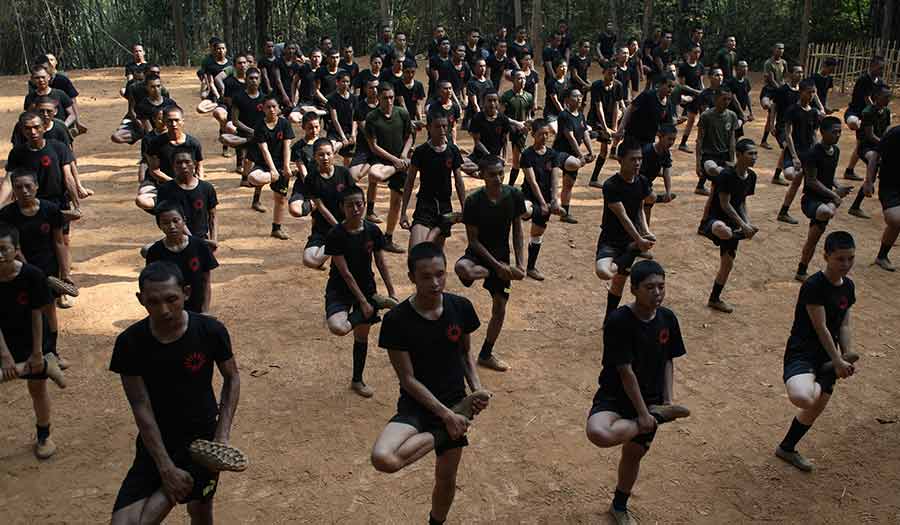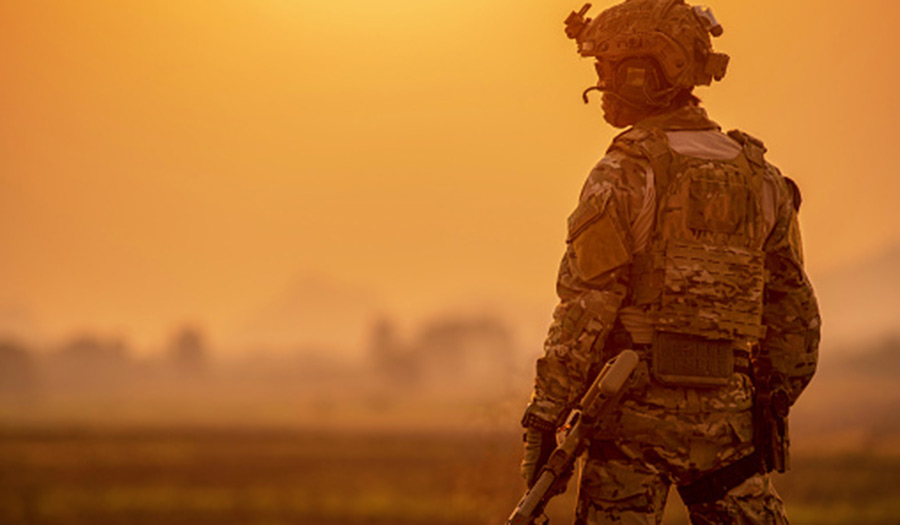 REUTERS/Stringer
REUTERS/Stringer
World News Desk
Learn the why behind the headlines.
Subscribe to the Real Truth for FREE news and analysis.
Subscribe NowReuters – A dense bamboo forest in rebel-held territory surrounds the training ground in eastern Myanmar where more than 100 young people, mostly in their twenties, are undergoing rigorous military drills.
From former chefs to ex-journalists, rappers and poets, people from all walks of life have joined the resistance movement with a single goal: to overthrow the military regime that seized power in the Southeast Asian nation in 2021.
The Bamar People’s Liberation Army (BPLA), led by onetime anti-war poet Maung Saungkha, is a prominent force in Myanmar’s resistance movement.
A trainer, whistle in hand, commands the synchronized movements of the recruits. Discipline is enforced with harsh blows for any mistake. Under the scorching sun, sweat soaks their bodies, and their skin is marked with bruises from the demanding training.
The trainees’ daily routine starts at 4 a.m. and ends at 9 p.m., with Sunday being their only day off. They endure hours of intense training without being allowed a single drop of water during the sessions.
Representing Myanmar’s Bamar ethnic majority, the BPLA was formed in April 2021 to fight the junta after it toppled an elected government in February that year. Since October, the group has been a key player in Operation 1027, a joint offensive with other rebel militias that has significantly weakened the military.
Myanmar, which won independence from Britain in 1948, has long been dominated by its military. A brief spell of civilian rule ended with the 2021 coup that toppled the government of Nobel laureate Aung San Suu Kyi.
For those joining the fight under the BPLA’s banner, their home in the jungle are makeshift tents, accommodating around 20 to 30 people each.
Their sleeping mats are laid out a few inches apart on the floor. Maintaining a tidy space is essential, so uniforms, toiletries and study books are neatly arranged on their makeshift beds.
The BPLA’s basic training is renowned for its harshness and strict discipline. The training spans three months, pushing recruits to their physical and mental limits. Upon arrival at the training camp, all personal belongings, including phones, are confiscated and returned only after the completion of the training period.
One trainee, an 18-year-old woman standing about 5 feet tall, shows signs of wear from the grueling regimen. She has dark circles under her eyes, her hair is cut almost to the scalp, and her skin is sunburned from long hours spent outdoors. Despite her exhaustion, she carries a hint of resilience and determination.
Among her few possessions, she said, was a stuffed toy that she brought with her to the camp. When asked about it, she smiled and said: “One of the trainers kept it for me, and she will give it back after the training.”
Lessons in Politics
In addition to military training, BPLA recruits undergo political education. After morning drills, a short break allows for rest or review of recent political lessons.
Following dinner, everyone gathers in the bamboo-constructed assembly hall. The BPLA flag hangs above the whiteboard. Powered by a generator, fluorescent lights illuminate the room. Here, evening political classes take place.
Every evening, Maung Saungkha delves into the BPLA’s founding principles, government structure, federalism, and even gender equality. His words echo through the makeshift hall.
“I know you’re exhausted,” he told them, “but a soldier’s duty transcends fatigue.”
One night, as the lesson progresses, a chilling silence descends upon the camp. A junta scout drone has detected their presence. The generator shuts down, plunging the camp into darkness. Everyone freezes, waiting for the drone to disappear.
The following morning, Maung Saungkha gathers his officers to reinforce emergency procedures in case of a fighter jet attack. The roar of jets is a familiar threat in the jungle, but vigilance remains crucial.
Ma Chel, a 25-year-old woman and deputy head of recruitment and screening for the BPLA, recalls her journey from civilian to soldier. After completing basic training, she said she was proud to become an instructor.
“My trainer told me that if one soldier goes to the frontline, there’s one bullet fired. But if 100 students go, there are 100 bullets,” Ma Chel said. “This made me feel proud and motivated.”
Last April, the BPLA held a graduation ceremony for new recruits. Soon after the graduation, some of them were sent to the frontlines in Karen State. More than 20 BPLA soldiers have died in battles since 2021, including some from the recent graduate batch in April, the movement’s leaders said.
One of the young recruits, a young woman who asked to be identified only by the initials G.G. reminisced on the transformation from soft city girl to revolutionary.
“I couldn’t hold a gun at first because it was so heavy, and I had to be really careful when handling it,” G.G. said.
She marvels that before the coup, she could barely walk up to her family’s fifth-floor apartment but now carries heavy bags up steep hills.
She once dreamed of working in a hotel and had started hospitality training before the coup. But here in the jungle, that seems a distant memory.
“I might continue working toward my dream,” she said. “If I am still alive after the revolution.”
- Real Truth Magazine Articles
- ANALYSIS
 ‘…Neither Shall They Learn War Anymore’
‘…Neither Shall They Learn War Anymore’
More on Related Topics:
- What to Know About South Korean Acting President Han’s Impeachment
- The Stunning Fall of Syria’s Government
- Syria: What Has Assad’s Fall Revealed About the Captagon Drug Trade?
- South Korea’s Parliament Votes to Impeach President Yoon Suk Yeol over Martial Law Order
- From Budgets to Diplomacy, South Korea Reels from Martial Law Fallout


